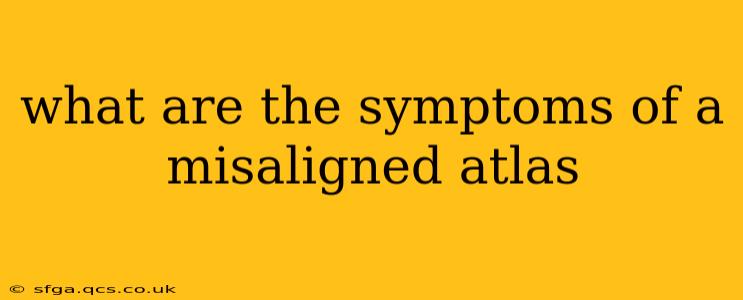The atlas, the first cervical vertebra (C1), is a crucial part of your spine, supporting your head and facilitating a wide range of movement. A misalignment, also known as an atlas subluxation, can lead to a variety of symptoms, although it's important to note that the connection between atlas misalignment and many of these symptoms is debated within the medical community and not universally accepted. Many practitioners believe that correcting an atlas subluxation can alleviate these symptoms, while others remain skeptical. It is crucial to consult with a healthcare professional for a proper diagnosis and treatment plan.
This article will explore potential symptoms associated with a misaligned atlas, but it is not a substitute for professional medical advice. Always seek the opinion of a doctor or qualified healthcare provider before making any decisions related to your health.
Common Reported Symptoms of Atlas Misalignment
Many individuals report experiencing a range of symptoms they believe are connected to an atlas misalignment. These often stem from the atlas's role in supporting the head and its proximity to the brainstem and nervous system. These symptoms can be subtle or severe and vary greatly from person to person. Some common reported symptoms include:
- Headaches: Frequent headaches, including migraines and tension headaches, are often cited. These may be localized to one side of the head or more widespread.
- Neck Pain: Stiffness, pain, and limited range of motion in the neck are common complaints. The pain can vary in intensity and location.
- Back Pain: Surprisingly, many report back pain, potentially due to compensatory mechanisms the body uses to cope with the atlas misalignment.
- Shoulder Pain: Pain and discomfort in one or both shoulders can be experienced.
- Jaw Pain (TMJ): Temporomandibular joint disorders (TMJ) are sometimes associated with atlas misalignment due to the intricate network of muscles and nerves in the head and neck.
- Dizziness and Vertigo: Some individuals experience feelings of dizziness, lightheadedness, or vertigo. This is linked to the potential impact on blood flow and nerve function.
- Fatigue: Persistent fatigue and low energy levels are also reported.
- Postural Problems: Poor posture, including forward head posture, is a common observation.
- Numbness and Tingling: Numbness or tingling sensations in the arms, hands, or other parts of the body are sometimes reported, potentially due to nerve irritation.
Less Common, But Reported Symptoms
While less frequently reported, some individuals associate these symptoms with an atlas misalignment:
- Tinnitus (ringing in the ears): The close proximity of the atlas to the inner ear could be a contributing factor, though further research is needed.
- Scoliosis: While not directly causing scoliosis, an atlas misalignment may exacerbate existing postural issues leading to scoliosis development or progression.
What Causes Atlas Misalignment?
Several factors can contribute to atlas misalignment:
- Trauma: Whiplash from a car accident, falls, or sports injuries are common causes.
- Poor Posture: Prolonged periods of poor posture can strain the neck muscles and lead to misalignment.
- Stress: Chronic stress can affect muscle tension and posture, potentially contributing to misalignment.
- Birth Trauma: Difficult births can sometimes result in atlas misalignment in infants.
How is Atlas Misalignment Diagnosed?
Diagnosing an atlas misalignment isn't always straightforward. While X-rays can show the position of the atlas, they don't always correlate with the presence or severity of symptoms. Some practitioners use specialized techniques, such as palpation (manual examination) and other diagnostic methods. It's important to find a qualified healthcare professional with experience in assessing spinal alignment.
Disclaimer: This information is for educational purposes only and should not be considered medical advice. If you are experiencing any of the symptoms mentioned, consult with a doctor or qualified healthcare professional for proper diagnosis and treatment. Self-treating can be harmful, and a thorough examination is essential.
